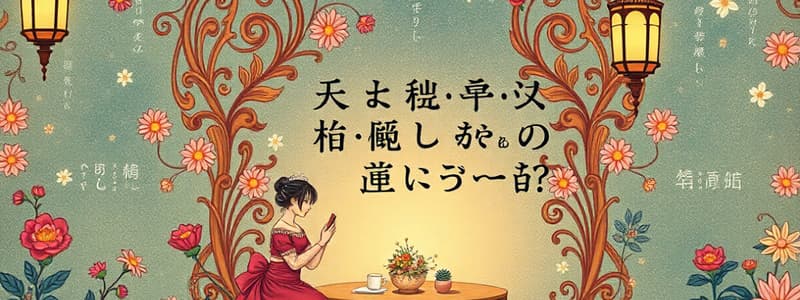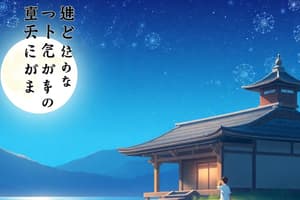Podcast
Questions and Answers
What is the meaning of 'Nihon' or 'Nippon'?
What is the meaning of 'Nihon' or 'Nippon'?
- Land of the Mountains
- Land of the Sea
- Land of the Rising Sun (correct)
- Land of the Cherry Blossom
Which of the following is NOT one of the four major islands of Japan?
Which of the following is NOT one of the four major islands of Japan?
- Okinawa (correct)
- Kyushu
- Honshu
- Hokkaido
What is the highest mountain in Japan?
What is the highest mountain in Japan?
- Mt. Fuji (correct)
- Mt. Tate
- Mt. Hokkaido
- Mt. Kitadake
How many prefectures is Japan administratively divided into?
How many prefectures is Japan administratively divided into?
Which season corresponds to March, April, and May in Japan?
Which season corresponds to March, April, and May in Japan?
What is the capital city of Japan?
What is the capital city of Japan?
Which climate zone is associated with Hokkaido?
Which climate zone is associated with Hokkaido?
What is the national flower of Japan?
What is the national flower of Japan?
What is a traditional Japanese inn called?
What is a traditional Japanese inn called?
Which of the following statements about omiyage is true?
Which of the following statements about omiyage is true?
What is a key difference in the use of an ofuro in Japan?
What is a key difference in the use of an ofuro in Japan?
Which line is known as a loop line in Tokyo?
Which line is known as a loop line in Tokyo?
Which of the following gardens is NOT one of the three Great Gardens of Japan?
Which of the following gardens is NOT one of the three Great Gardens of Japan?
What is the main focus of the Imperial Palace in Japan?
What is the main focus of the Imperial Palace in Japan?
Which of the following cities is NOT associated with a famous onsen?
Which of the following cities is NOT associated with a famous onsen?
Which museum is known for having 85,000 objects?
Which museum is known for having 85,000 objects?
What are the three main techniques used in Karate?
What are the three main techniques used in Karate?
Which of the following best describes Bonsai?
Which of the following best describes Bonsai?
How many syllables does a Haiku contain?
How many syllables does a Haiku contain?
What is a Meishi in Japanese culture?
What is a Meishi in Japanese culture?
What function does Furoshiki serve in Japan?
What function does Furoshiki serve in Japan?
What does Shintoism primarily embody in Japanese culture?
What does Shintoism primarily embody in Japanese culture?
Which shrine is considered the most venerated in Shintoism?
Which shrine is considered the most venerated in Shintoism?
What is Kabuki primarily known for in Japanese traditional theatre?
What is Kabuki primarily known for in Japanese traditional theatre?
What does Ikebana focus on in its flower arrangements?
What does Ikebana focus on in its flower arrangements?
Which of the following is not typically considered a major form of traditional theatre in Japan?
Which of the following is not typically considered a major form of traditional theatre in Japan?
What is the significance of Sumo in Japanese culture?
What is the significance of Sumo in Japanese culture?
Which game is a vertical pinball game popular in Japan?
Which game is a vertical pinball game popular in Japan?
Which site is known for housing the largest bronze Buddha in Japan?
Which site is known for housing the largest bronze Buddha in Japan?
What is the Japanese dish typically made with thinly sliced beef and vegetables cooked in a hot broth?
What is the Japanese dish typically made with thinly sliced beef and vegetables cooked in a hot broth?
Which item is served at the beginning of a Japanese meal that provides a fresh feeling?
Which item is served at the beginning of a Japanese meal that provides a fresh feeling?
What is not a traditional part of a Japanese meal?
What is not a traditional part of a Japanese meal?
What should soy sauce not be poured onto in Japanese dining?
What should soy sauce not be poured onto in Japanese dining?
Which of the following beverages is a type of Japanese rice wine?
Which of the following beverages is a type of Japanese rice wine?
Which dish consists of small blocks of vinegared rice commonly served in Japanese cuisine?
Which dish consists of small blocks of vinegared rice commonly served in Japanese cuisine?
Which Japanese noodle type is often slurped noisily as part of its cultural dining etiquette?
Which Japanese noodle type is often slurped noisily as part of its cultural dining etiquette?
Which is a common mistake while using chopsticks in Japanese dining?
Which is a common mistake while using chopsticks in Japanese dining?
Flashcards are hidden until you start studying
Study Notes
Interrogative Words in Japanese
- Who: dare / dare desu ka
- What: nan/nani / nan desu ka
- Where: doko / doko desu ka
- When: itsu / itsu desu ka
- Why: doushite / naze / doushite desu ka
- How: dou / dou desu ka
- Which: dore / dochira / dore desu ka
- What kind: donna
Basic Information About Japan
- Japan, known as Nihon or Nippon, translates to "Land of the Rising Sun."
- An archipelago in the Pacific Ocean, located east of the Asian continent.
- Covers a total land area of 377,907 square kilometers, making it the 4th largest archipelago globally.
- Comprises four major islands: Hokkaido, Honshu, Shikoku, and Kyushu.
- Tokyo, the capital, is situated on Honshu and houses the Imperial Palace, the Diet, and the Supreme Court.
Geography and Climate
- Japan is divided into 47 prefectures.
- Mt. Fuji is the highest mountain.
- National flower: Cherry Blossom (Sakura).
- Climate ranges from subarctic in Hokkaido to subtropical in Okinawa, with Tokyo as an intermediary climate zone.
- Experiences four distinct seasons: Spring (Haru), Summer (Natsu), Autumn (Aki), and Winter (Fuyu).
Cultural Practices
- Japanese customs regarding gift-giving include not expecting anything in return, using both hands for exchanges, and not opening gifts in front of others.
- Ryokan (traditional inns) offer first-hand experiences of Japanese customs.
- Ofuro refers to the Japanese bath, which is part of the bathing ritual emphasizing relaxation and no soap inside the tub.
Transportation
- Subway: "chikatetsu," Train: "densha."
- Japanese public transportation is known for its speed, cleanliness, and efficiency.
- Notable train lines include Yamanotesen in Tokyo and Kanjosen in Osaka.
Sightseeing Highlights
- Historical Castles: Himejijoo, Osakajoo, and Nijojoo.
- Renowned Gardens: Kenrokuen (Kanazawa), Kairakuen (Mito), and Korakuen (Okayama).
- Famous Hot Springs (Onsen) include Noboribetsu in Hokkaido and Beppu in Oita.
- Major Museums: Tokyo National Museum (85,000 objects), Kyoto National Museum (10,000 objects), and Kurashiki Folk Craft Museum.
- Religious Sites: Ise Shrine (Shinto) and Todaiji Temple (Buddhism).
Traditional Arts and Entertainment
- Kabuki: Classical dance drama portraying daily life in Japan.
- Bunraku: Puppet performance considered equivalent to orthodox drama.
- Noh: The oldest form of professional theatre, known for its musical dance-drama.
- Ikebana: Japanese flower arrangement reflecting sky, earth, and mankind.
- Popular games include Pachinko (pinball) and Mahjong.
Sports and Cuisine
- Sumo, Japan's national sport, features wrestlers in traditional attire.
- Baseball and Golf are also popular.
- Tipping is unnecessary, with service charges included.
- Common dishes: Sushi, Tempura, Yakitori, and Ramen among others.
- Essential Japanese ingredients include Tofu, Wasabi, Shoyu (soy sauce), and Mirin (sweet rice wine).
Dining Etiquette
- Restaurants may not always provide menus or list prices.
- Slurping noodles is acceptable; soy sauce should not be poured over rice.
- Chopsticks, known as Hashi, are commonly used, and their misuse can be considered rude.
Miscellaneous Cultural Elements
- Sadou: The traditional tea ceremony for preparing green tea.
- Bonsai: Art of cultivating miniature trees.
- Origami: Craft of folding paper into various shapes.
- Haiku: A traditional poetic form consisting of 17 syllables with seasonal references.
- Furoshiki: Cloth used for wrapping goods.
- Kimono: Traditional Japanese garment.
- Meishi: Business cards exchanged in formal settings.
Travel Information
- Flight duration from Manila to Japan is approximately three and a half hours.
- Japan is one hour ahead of Philippine time.
Studying That Suits You
Use AI to generate personalized quizzes and flashcards to suit your learning preferences.





